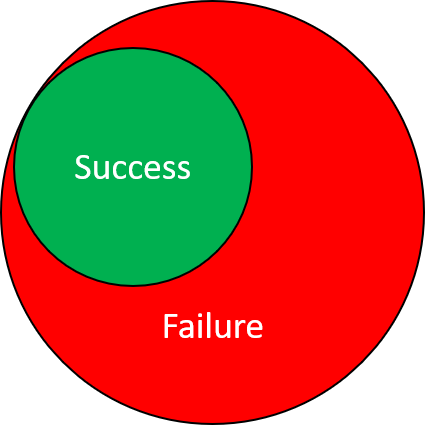None of us like to admit failure, we tend to want to celebrate our successes. We have a mindset that says, “Do more of what causes you to succeed!”
I suppose it’s human nature to accentuate the positive, but I think it limits us, individually and organizationally. Success is not the strict opposite of failure. Focusing on why we succeed limits us to understanding a small subset of the opportunity. It limits our ability to learn, grow, and achieve.
It also blinds us to the need to change. Our, our competitors, and our customer’s worlds are constantly changing. By limiting ourselves to what has always worked, we, increasingly limit our ability to succeed.
One might visualize success and failure in the following way:

While the relative size of the circles may vary, our failures will always exceed our successes. Even if we have 100% market or customer share, that is never sustainable. Things always change!
Literally and philosophically, our failures offer us the greatest opportunity to grow, to innovate, to do new things.
It’s odd, other disciplines embrace this concept of failure. It is the foundation of all scientific thinking, it’s embraced as a “mantra” in most of Silicon Valley. There are thousands of stories of inventors and entrepreneurs failing until the succeed (and some are pure fiction).
The reality is we probably fail more than we succeed. By ignoring our failures, reveling only on our success, we miss opportunity. Ir
Paradoxically, by understanding why we fail, we increase our success!
As ever a thought-provoking post…
Making mistakes, having failures, learning from them and moving on – always a topic of interest and applicable in so many fields of human endeavor.
You may recall I’m ex Air Force, serving in a front line helicopter squadron and being heavily involved in flight safety. I’m also a bit of a space nut…
I’m just listening to a truly excellent 11 part podcast documentary by the BBC World Service to commemorate the 50th anniversary of the first Moon landing on 20th July. It’s called “The Final 13 Minutes” and is focused on the powered descent & landing of Armstrong & Aldrin in their ‘Eagle’ lunar lander – a phase that lasted 13 minutes.
How they writer & presenter managed to cram an amazing 13 minutes of history in to 11 x 45 minute episodes and keep the listener gripped and drawn in is a master class in communicating facts, emotions and history…
Anyway, one of the episodes included a major piece on the Apollo 1 fire on the pad in late January 1967 that killed the 3 astronauts Gus Grissom, Roger Chaffee and Ed White. That piece includes interviews recorded some years ago with Gene Kranz, NASA’s legendary flight controller, and some of the engineers and mission controllers.
One thing they all said that struck me…
… that without the tragic disaster that was the Apollo 1 pad fire, and the deaths of Grissom, Chaffee and White, the Apollo program and achieving President Kennedy’s objective by the end of 1969 would very likely have failed and ended NASA’s manned space flight program as well due to the spacecraft likely being lost in flight and nobody on the ground would have been able to determine what went wrong & why. The Service and Command module was a shoddy piece of design & workmanship, and everybody knew it – the time pressures were driving people to make mistakes in decision making and leadership.
The day after the fire Gene Kranz got his mission controllers together and gave quite the monologue on being tough & competent – you can see him in this short video re-enacting it for NASA’s Oral History project.
https://www.youtube.com/watch?v=9zjAteaK9lM
What this particular podcast episode goes on to cover in detail next is the flight of Apollo 7 – 21 months after the pad fire… a totally redesigned & rebuilt spacecraft getting its first flight ever – and with a human crew – on the face of it very risky… BUT every aspect of that ship and the operating procedures of everything around it had been overhauled and reviewed.
The Apollo 7 mission was a stupendous success – everything worked almost perfectly and on time… over 2 million parts in that machine that lifted off the pad that late October morning in 1968 for it’s 10 minute ride in to orbit.
Kranz and the other NASA folk being interviewed then all said the same thing about Apollo 7 – that without it’s success and the way everybody in the program got behind it after the pad fire, the program and Kennedy’s dream would have died…
It was the Apollo 1 tragedy that spurred people to a new mindset. It was the success of Apollo 7 that showed everybody, especially the doubters, that success was with reach. Without those 2 events, Kennedy’s dream would not have happened – history would have recorded a very different outcome – with who knows what kind of impact on the psyche and prestige of the US.
Sometimes it’s OK to succeed by trial and error. Sometimes the cost of doing it that way is prohibitive.
What perhaps is always a given is this – not learning from your mistakes is not acceptable if you want to succeed, if you want things to get and be better.
Happy Independence Day from a transplanted Brit!
Cheers
Martin
Martin: First, it’s so good to see you back! I always value your insights, as proven by this comment. Thanks so much for adding this perspective.
Specificity is a super power as it reduces the chance of being misunderstood and boost the credibility and memorability of your message yet it must begin by gaining greater self-clarity about yourself and what belief and/or action you want others to take after reading or hearing your message. I enable on how and why in my book, Opportunity Makers